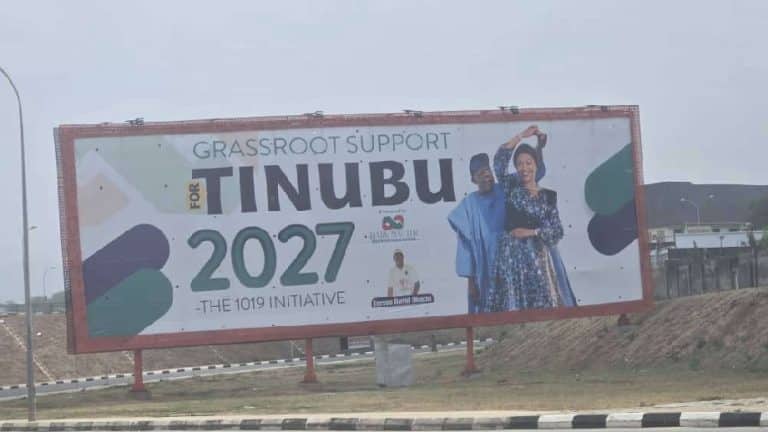
The Independent National Electoral Commission (INEC) has come under verbal attack by political analysts, civil society leaders, and electoral experts over what they describe as its failure to control political parties and their disregard for campaign laws.
They argue that while the laws governing Nigeria’s elections are clear, institutions responsible for enforcing them have become too weak or too reluctant to act, allowing political parties, particularly the ruling All Progressives Congress (APC), to go unchecked.
The controversy was reignited recently when residents of Abuja woke up to gigantic billboards showing President Bola Tinubu holding hands with his wife, Senator Oluremi Tinubu, alongside the inscription: “Grassroots Support for Tinubu 2027.”
Bellnews reports that the posters, boldly displayed across major highways, were widely interpreted as a premature declaration of the President’s intention to seek a second term, three years before the next general election.
Though the Presidency quickly denied involvement, insisting it did not sponsor or authorise the billboards, the explanation did little to calm public outrage.
Similar banners reading “Tinubu Continuity 2027” and featuring Jigawa State Governor Umar Namadi have since appeared in other cities.
Political actors argue that even if the materials were sponsored by third-party groups or supporters, INEC and regulatory agencies should have acted swiftly, either by questioning their legality or ordering their removal.
Beyond billboards, social media platforms like Facebook, 𝕏 (formerly Twitter), TikTok, Instagram, and YouTube have become hotbeds for early campaigns, with videos, songs, skits, and hashtags promoting aspirants long before the official campaign period.
Despite occasional warnings from INEC, many of these materials remain online. Even after the Presidency’s directive that they be taken down, most promoters ignored the order.
Analysts say this unchecked behaviour shows how weak the enforcement system has become, with both INEC and advertising regulators appearing powerless.
INEC’s Hands Are Tied by the Law’ – Yakubu
Recently, at a roundtable in Abuja convened by INEC to address the growing abuse of campaign timelines, the immediate past Chairman, Mahmood Yakubu, admitted that the Commission’s powers are limited by the Electoral Act itself.
He explained that while INEC is both a regulator and registrar of political parties, it faces legal obstacles in sanctioning offenders.
“INEC, as registrar and regulator of political parties, is expected to act in the face of the brazen breach of the law on early campaigns,” Yakubu said.
“However, the major challenge for the Commission is the law itself. Section 94(2) of the Electoral Act 2022 imposes only mild sanctions — a maximum fine of ₦500,000, on anyone who campaigns 24 hours before polling day. But there is no sanction whatsoever for campaigns that happen earlier than 150 days before an election. That’s the real challenge.”
He noted that Section 94(1) of the Act clearly states that campaigns should begin 150 days before polling day and end 24 hours before it, but since there is no penalty for early violations, politicians exploit this loophole freely.
Analysts, however, have criticised Section 92(4) of the Electoral Act, which allows parties to hold rallies and meetings “at any time” for political purposes, provided the police are consulted.
This clause, they say, contradicts the campaign timeline in Section 94, giving politicians and their supporters room to justify premature campaigns under the guise of political meetings or consultations.
Experts believe these conflicting provisions reflect a weak regulatory framework that needs urgent reform.
Former INEC Chairman, Prof. Attahiru Jega, in a recent presentation, called for a comprehensive overhaul of Nigeria’s campaign regulations to close loopholes and strengthen accountability.
“All campaign offences, especially premature campaigns, should be clearly defined, with stiff penalties applied,” Jega said.
“Incumbent officeholders and their political parties should be vicariously held responsible for premature campaigns by third parties.”
The former INEC boss urged the Economic and Financial Crimes Commission (EFCC) and Independent Corrupt Practices Commission (ICPC) to track third-party campaign funding, warning that many of such groups may be used to launder public funds.
Jega also emphasised that when calculating campaign spending limits, expenses by third-party promoters should be included in candidates’ total expenditure to prevent abuse.
“Election Management Bodies such as INEC and SIECs must collaborate closely to ensure sanctions and penalties are properly enforced,” he said, adding that an Elections Offences Commission and Tribunal should be established before the 2027 elections.
‘We Have a Problem With Obeying the Law’ – Ene Obi
Commenting, the Convener of the Nigerian Civil Society Situation Room and former ActionAid Nigeria Country Director, Ene Obi, described the situation as a reflection of Nigeria’s wider disregard for the rule of law.
“Some people have started posting posters, and others claim they don’t know who put them up,” Obi said in an interview with Daily Post.
“We have a problem with obeying the law. INEC has not announced the timetable yet. So, is it premature or not? INEC must be able to hold people accountable.”

